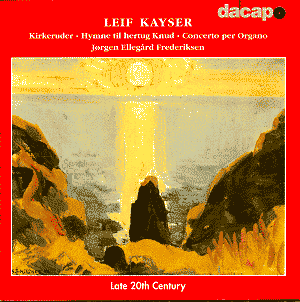Leif Kayser, who died earlier this year, can lay claim
to having been the most prolific Danish composer of Organ music in the
20th Century. He also composed concertos and much chamber music. He
was an organist; indeed he gave the first performance of his ‘Concerto
for Organ’ He studied music at the Royal Danish Academy of Music in
Copenhagen. His 1st Symphony was performed, with considerable
success, as early as 1938. He was also a Roman Catholic priest from
about 1942 onwards. He was the priest in charge of St. Ansgar’s Church,
Copenhagen until in 1964 he was granted permission to leave to devote
himself again to composition.
His musical language is difficult to pin down. The
booklet notes by Jorgen Ellegard Frederiksen describe the music as existing
"on a high artistic plane with great density of information" … He goes
on to say that the music "inhabits a matchless world of spiritual richness
and beauty".
Stylistically I sometimes heard bits of Vagn Holmboe
and Marcel Dupré but to go further could be misleading. The style
is not dissimilar to that of the late nineteenth century and the notes
tell us that his style is also "profoundly personal".
Seven glass mosaic windows in the apse of Skovshoved
church inspired ‘Church Panes’. They include movements entitled ‘The
Fall’ and ‘Christ’ - both based on a Danish Hymn tune and ‘Alpha and
Omega’ based on the plainchant melody Kyrie IV. The work is described
as "free organ pieces in a cantata of hymns". It is an impressive work
- one I will return to and although it is a spiritual work it is definitely
not of the holy minimalist variety. Particularly striking is the opening
unison melody striding out like a modern plainchant. When the harmony
arrives it seems inevitable and uplifting.
The Concerto is slightly less original but a fine work
which repays listening. It falls into five movements and lasts over
half-an-hour. The booklet notes quote the opening of the first movement
and demonstrate how the whole work is based upon just three motifs.
It shows masterly control. A further more detailed analysis is given
in the notes.
It is disappointing that the organ specification is
not offered. I am no organ ‘buff’ but some information along those lines
is ‘de rigueur’ nowadays. I feel that the music could be more colourfully
conveyed. Is the organ not able to do so, or does the problem lie with
the rather dull recording which, whilst perfectly serviceable, is far
from vivid and strong? One good thing about it is that you can set the
volume at the start and it is never so quiet or so loud that you have
to keep getting up to alter it.
Jorgen Ellegard Frederiksen, organist of Absalon Church,
Copenhagen, teaches at the Danish Academy of Music. He is a well known
soloist in Denmark and has performed abroad. His particular interest
is in the German Romantic tradition. He obviously believes strongly
in these Kayser works and plays them with beautiful phrasing and sensitive
registration.
It seems that more music by Kayser may be released
next year - possibly the early symphony. Look out for it. The Danes
have a way of never shouting about their talented artists, we have to
search and when we find their music there are incredible discoveries
to be made.
Gary Higginson

![]() Jorgan Ellegard Frederiksen
on the organ at Helligandskirken
Jorgan Ellegard Frederiksen
on the organ at Helligandskirken ![]() DA CAPO 8.224167
[65.12]
DA CAPO 8.224167
[65.12]